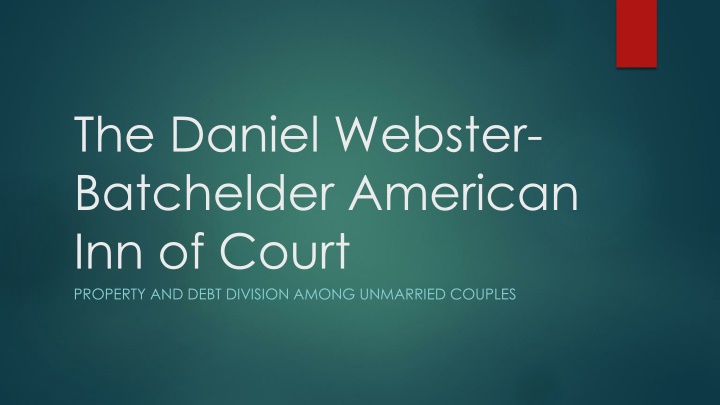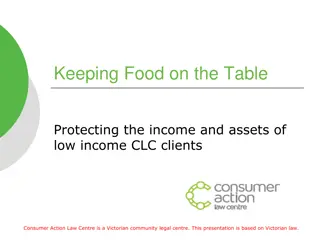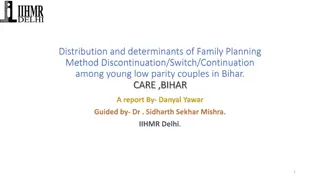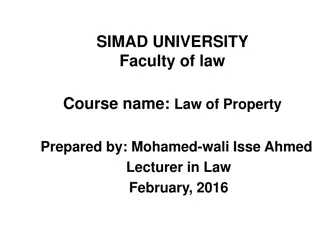Property and Debt Division Among Unmarried Couples: Legal Insights
The Daniel Webster-Batchelder American Inn of Court explores the intricacies of property division among unmarried couples through petition actions in the court. This legal process involves considerations like contributions to property, duration of occupancy, contractual agreements, and more. An engaging skit involving Jill and Jack sheds light on a real-life scenario of property dispute, emphasizing the complexities and emotions involved in such cases.
Download Presentation

Please find below an Image/Link to download the presentation.
The content on the website is provided AS IS for your information and personal use only. It may not be sold, licensed, or shared on other websites without obtaining consent from the author.If you encounter any issues during the download, it is possible that the publisher has removed the file from their server.
You are allowed to download the files provided on this website for personal or commercial use, subject to the condition that they are used lawfully. All files are the property of their respective owners.
The content on the website is provided AS IS for your information and personal use only. It may not be sold, licensed, or shared on other websites without obtaining consent from the author.
E N D
Presentation Transcript
The Daniel Webster- Batchelder American Inn of Court PROPERTY AND DEBT DIVISION AMONG UNMARRIED COUPLES
Partition Action 547-C:2. Petition. A petition may be filed in the superior or probate court If there is an underlying matter petition to partition must be filed in the same Court. Jury trials expressly permitted, however in superior court only. See Gilman v. Lake Sunapee Props., 159 N.H. 26 (2009).
Partition Action Under New Hampshire statutory law, RSA 547-C:29 permits the Superior Court or the Probate Court (RSA 547-C:2) in its discretion to assign the property or its proceeds on sale as a whole or in such portions as may be fair and equitable. The Court in exercising its discretion to determine what is fair and reasonable in a case may consider: (i) the direct or indirect actions and contributions of the parties to acquisition, maintenance, repair, preservations, improvement, and appreciation of the property; (ii) the duration of the occupancy and the nature of the use made of the property by the parties; (iii) disparities in contributions of the parties to the property; (iv) any contractual agreements entered into between the parties in relation to the sale or other disposition of the property;
Partition Action (v) waste or other detriment caused to the property by the actions or inactions of the parties; (vi) tax consequences of the parties; (vii) other factors the court may deem relevant.
Skit 1 Jack and Jill - Intro Jill and her husband were together for 45 years prior to his death. Jill was 76 at the time of his death. Six years ago, and recently widowed, Jill thought she found love again in the North Country with fellow widower, Jack. Unfortunately, it wasn t meant to last for poor Jill. At 82, she now finds herself in her attorney s office trying to resolve her property dispute with Jack.
Skit 1 Jack and Jill - Facts Jill sold her cabin in the North Country and bought condominium in the 55+ community in Portsmouth with Jack contributing $75,000 of the purchase price and Jill contributing $175,000 for a total of $250,000 However the title company put the condominium in both Jack and Jill s name as joint tenants with rights of survivorship. The parties shared HOA fees, taxes, insurance and utilities. Both parties had individual wealth. Jill was diagnosed with pancreatic cancer, triggering Jack to break-up the parties relationship because his spouse died of the same disease. Jack asks Jill to move out. She does so. Jack wants to keep the condominium. Jill wants to be able to provide something to her children.
Skit 1 Jack and Jill Questions What are the potential issues with Jill s case? What rights does your client have when both parties own the property jointly? What advice do you provide your client regarding the tenancy of the couple s condo? Can Jill break the joint tenancy?
Skit 1 Jack and Jill Scenario 2 Same circumstances as to how Jack and Jill got together and when they purchased the Portsmouth condominium in the 55+ but the change of facts is they just put the property in Jack's name. The $250,000 condominium price was paid with Jill paying $75,000 and Jack paying $175,000 with them both splitting the buyer closing costs. No mortgage was taken out. They both since equally contributed to the HOA fees and taxes as well as insurance and utilities. Would there be different analysis if Jill had not paid any portion of the purchase price, but contributed $1,200 per month to Jack for the expenses when the HOA fees and taxes as well as insurance and utilities only were that $1,200 per month so Jack did not have to pay any of those monthly costs out of his own pocket? What are the potential remedies when title is not in both names?
Skit 1 Jack and Jill Scenario 3 Same circumstances as to how Jack and Jill got together and when they purchased the Portsmouth condominium in the 55+. However, now Jack recently died. Jack and Jill were still living together at the time of Jack owning the real estate, but Jack s adult children ask Jill to vacate the property so that they can sell the condominium. What are Jill s potential remedies?
Tenancy Issues RSA 477:18 Tenants in Common Every conveyance or devise of real estate made to 2 or more persons shall be construed to create an estate in common and not in joint tenancy, unless it is explicitly expressed or inferred by devise. Insufficient to Create Joint Tenancy Use of the phrase and to the survivors of them in the clause of a deed reciting the consideration and names of the grantees is not a sufficient and clear expression to create a joint tenancy where no other clause in the deed contains words indicative of any estate other than a tenancy in common. Gagnon v. Pronovost, 96 N.H. 154 (N.H. 1950). Sufficient to Create Joint Tenancy Where a real estate deed recited that consideration was paid by husband and wife, as joint tenants, or survivor and the names of both were used in all but one instance in the instrument, the deed created an effective joint tenancy. In re Allaire Estate, 103 N.H. 318 (N.H. 1961).
Tenancy Issues Unilateral Breaking of Joint Tenancy Irrespective of the intent of the parties' reasoning for the creation of the joint tenancy, under New Hampshire law it appears clear that one joint tenant may alienate or convey her interest in the property thereby defeating the right of survivorship. See Mulvanity v. Nute, 95 N.H. 526, 528 (1949); Land Am. Commonwealth Title Ins. Co. v. Kolozetski, 159 N.H. 689, 692 (2010) [a Justice Hicks' decision]; and Hayes v. S. New Hampshire Med. Ctr., 162 N.H. 756, 759 (2011) [a Justice Conboy decision].
Tenancy Issues Unilateral Breaking of Joint Tenancy Example: Boissonnault v. Savage, 137 N.H. 229 (1993). Creditor received a judgment against a Husband. To satisfy the judgment, Husband s interest in marital home was auctioned at Sheriff s Sale, and was purchased by Creditor. Creditor brought a petition for partition, which the Superior Court denied. The NH Supreme Court reversed. Supreme Court held that Sheriff s Sale severed the joint tenancy, thereby converting ownership into a tenancy in common. Wife did not retain her right of survivorship. As a tenant in common, Creditor could compel partition. The Court held that the statutory provisions regarding homestead rights merely established the duration of the right and did not entitle Wife to occupy the marital premises and preclude Creditor from seeking partition.
Common-Law Spouse New Hampshire does not recognize common law marriage unless the following circumstances are met: Persons cohabiting and acknowledging each other as husband and wife, and generally reputed to be such, for the period of 3 years, and until the decease of one of them, shall thereafter be deemed to have been legally married. See, e.g., In re Estate of Buttrick, 134 N.H. 675 (1991); Bisig v. Bisig, 124 N.H. 372 (1983); Joan S. v. John S., 121 N.H. 96 (1981).
Common-Law Spouse Social Security Benefits? Social Security survivor benefits may also be available if the unmarried widow or widower establishes she or he is a common law spouse under New Hampshire law so there may be a situation where there are no assets to be probated that are subject to a spousal share yet a court finding of common law spouse may result in Social Security survivor benefits. The couple needs to have been married for 9 months or longer if not common law spouses for the survivor to qualify for Social Security survivor benefits.
Skit 2 Sam and Medy - Intro Sam and his longtime girlfriend, Medy, were together for 12 years prior to their breakup. They are 48 years old After starting a romantic relationship, the parties moved in to Medy s Manchester townhouse. They shared their personal finances through a joint bank account. All expenses for the parties were paid from that account. At last check, there was $200,000.00 in that account. Medy was the owner of Medusa, Inc. Sam was a software engineer. He was never made a stockholder. Through their joint efforts the parties greatly grew Medusa, Inc. from a company with gross revenues of $500,000.00 to one that grossed 5,000,000.00; shareholder equity grew from $20,000.00 to $1,800,000.00. The company last had cash/cash equivalents of 1.5 million.
Skit 2 Sam and Medy - Facts Over the past year, Medy became more controlling and abusive toward Sam, including frequent verbal abuse. Medy sold the company two days ago and terminated Sam s role with the company. Medy demanded that Sam leave her home immediately. Medy had an aggressive, screaming outburst toward Sam after Sam asked why she was doing this, which included: I don t have to explain myself, you re nothing without me, and you will be nothing when I am gone. The world will be a better place without you. Medy wanted Sam to sign a paperwork for a full release of interest from Medusa, Inc. for $50,000.00. If Sam disagreed with signing the release, Medy said she would f***ing kill him and make it look like an accident . Sam took some clothes and left the townhouse. The next day, the joint bank account was closed and his company credit cards were cancelled.
Skit 2 Sam and Medy Questions What should Sam do? What happens to the parties joint checking account? Does Sam have any legal rights to the funds? Assuming that Sam files a DV Petition with the Family Court, can he get his property permanently out of the townhouse? What rights does Sam have to Medusa, Inc.?
Domestic Violence Petition 173-B:2. Jurisdiction and Venue. I. The district division and the judicial branch family division of the circuit courts shall have concurrent jurisdiction over all proceedings under this chapter. II. If the plaintiff has left the household or premises to avoid further abuse, the plaintiff shall have the option to commence proceedings pursuant to RSA 173-B:3 in the county or district where the plaintiff temporarily resides. III. Proceedings under this chapter may be transferred to another court upon the motion of any party or of the court as the interests of justice or the convenience of the parties may require.
Domestic Violence Petition 173-B:4. Temporary Relief. I. Upon a showing of an immediate and present danger of abuse, the court may enter temporary orders to protect the plaintiff with or without actual notice to defendant. Temporary relief may include: (a) Protective orders: (3) Restraining the defendant from withholding items of the plaintiff's personal property which are specified in the order. A peace officer shall accompany the plaintiff in retrieving such property to protect the plaintiff;. (8) Restraining the defendant from taking, converting, or damaging property in which the plaintiff may have a legal or equitable interest. (10) Granting the petitioner exclusive care, custody, or control of any animal owned, possessed, leased, kept, or held by the petitioner, defendant, or a minor child in either household, and ordering the defendant to stay away from the animal and forbidding the defendant from taking, transferring, encumbering, concealing, committing an act of cruelty or neglect, or disposing of the animal.
Domestic Violence Petition 173-B:4. Temporary Relief. Temporary relief may include: (b) Other relief, including but not limited to: (1) Awarding to the plaintiff the exclusive use and possession of an automobile, home, and household furniture, if the defendant has the legal duty to support the plaintiff or the plaintiff's minor children, or the plaintiff has contributed to the household expenses. The court shall consider the type and amount of contribution to be a factor. (2) Restraining the defendant from taking any action which would lead to the disconnection of any and all utilities and services to the parties' household, or the discontinuance of existing business or service contracts, including, but not limited to, mortgage or rental agreements.
Financial Concerns 383-B:4-405. Joint Accounts. A written agreement between the financial institution and the owners of the account shall govern the owner s rights. In the absence of a written agreement, if 2 or more persons are named on a deposit account as owners, the account shall be payable to any owner, and in the event of death, to the survivor or survivors of them. Every owner is authorized to make transactions: if an owner of the account makes a withdrawal request, the bank is held harmless for any liability. Any owner is not prohibited from making or withdrawing any deposit in the account during his or her lifetime. This right extends to the owner s survivors.
Financial Concerns 383-B:4-405. Joint Accounts. - Survivors The survivors shall be entitled to ownership of the account whether or not: (i) the funds deposited were the property of only one or some of the owners, (ii) at the time of the making of such deposits there was any intention on the part of the owners making such deposit to vest the other owner or owners with a present interest therein, (iii) only one of the owners during their several lives had the right to withdraw such deposit, or (iv) there was any delivery of any bank book, account book, savings account book, certificate of deposit, or other evidence of such an account, by the owner or owners making such deposit to the other owner or owners.
Financial Concerns 383-B:4-404. Payable on Death Accounts. A payable on death ' deposit account is created in the name of an owner or several joint owners with a designation that the account is payable on death to one or more payees, and no other or further notice of the existence and terms of a legal and valid trust is given in writing to the bank. Each owner retains the right during the owner s lifetime to withdraw, assign, or pledge the balance of the deposit account, in whole or in part, as though no survivor payee or beneficiary had been named, and to delete or change a survivor payee or beneficiary. No change in the designation of the survivor payee or beneficiary is valid unless executed on a form and in the manner prescribed by the depository bank. Unless otherwise required in writing by all of the owners at the time the deposit account is created, the withdrawal, assignment or pledge of one owner shall be binding on the other owners. For purposes hereof, no payee or beneficiary shall be deemed to be an owner.
Financial Concerns 383-B:4-404. Payable on Death Accounts. On the death of the sole owner or the last surviving joint owner, any remaining balance in a payable on death account, including interest, shall vest solely in the surviving payable on death payee, or the in trust for beneficiary, or equally and severally in the then surviving payees or beneficiaries. If no payee or beneficiary survives, the deposit account shall remain in the estate of the last surviving owner. The rights of a surviving payee or shall not be denied, abridged or in any way affected because the rights have not been created by a writing executed in accordance with the laws of this state prescribing the requirements to effect a valid testamentary disposition of property or because of any absence of delivery or compliance with other requirements to effect a valid gift or transfer in trust.
Unjust Enrichment Unjust enrichment is an equitable remedy that is available when an individual receives a benefit which would become unconscionable for him to retain. Clapp v. Goffstown Sch. Dist., 159 N.H. 206, 210 (2009) (quotation omitted). One general limitation is that unjust enrichment may not supplant the terms of an agreement. Axenics, Inc. v. Turner Const. Co., 62 A.3d 754 (N.H. 2013); see also Clapp, 159 N.H. at 210.
Constructive Trust A constructive trust will arise when there has been a conveyance of an estate upon an oral promise to reconvey, and the conveyance was procured by fraud, duress or undue influence, made as security for a loan, or made between parties standing in a confidential or fiduciary relationship to each other. Cornwell v. Cornwell, 116 N.H. 205 (1976). Evidence of an oral agreement, otherwise unenforceable because of the statute of frauds, can be shown for the purpose of preventing unjust enrichment and establishing a constructive trust, and a court will not enforce the oral agreement, but rather, will impose a constructive trust on the property in favor of the beneficiary of the promise. Cornwell v. Cornwell, 116 N.H. 205 (1976).























